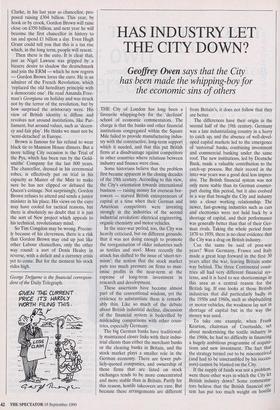HAS INDUSTRY LET THE CITY DOWN?
Geoffrey Owen says that the City
has been made the whipping-boy for the economic sins of others
THE City of London has long been a favourite whipping-boy for the `declinist' school of economic commentators. The charge is that the banks and other financial institutions congregated within the Square Mile failed to provide manufacturing indus- try with the constructive, long-term support which it needed, and that this put British firms at a disadvantage against competitors in other countries where relations between industry and finance were close.
Some historians believe that the problem first became apparent in the closing decades of the 19th century. According to this view, the City's orientation towards international business — raising money for overseas bor- rowers — starved British entrepreneurs of capital at a time when their German and American competitors were investing strongly in the industries of the second industrial revolution: electrical engineering, organic chemistry and motor vehicles.
In the inter-war period, too, the City was heavily criticised, but on different grounds: that it was not doing enough to promote the reorganisation of older industries such as textiles and steel. More recently the attack has shifted to the issue of 'short-ter- mism'; the notion that the stock market puts too much pressure on firms to max- imise profits in the near-term at the expense of long-term investment in research and development.
These assertions have become almost part of the conventional wisdom, yet the evidence to substantiate them is remark- ably thin. Like so much of the debate about British industrial decline, discussion of the financial system is bedevilled by misleading comparisons with other coun- tries, especially Germany.
The big German banks have traditional- ly maintained closer links with their indus- trial clients than either the merchant banks or the clearing banks in Britain, and the stock market plays a smaller role in the German economy. There are fewer pub- licly-quoted companies, and ownership of those firms that are listed on stock exchanges tends to be more concentrated and more stable than in Britain. Partly for this reason, hostile takeovers are rare. But because these arrangements are different from Britain's, it does not follow that they are better.
The differences have their origin in the second half of the 19th century. Germany was a late industrialising country in a hurry to catch up, and the absence of well-devel- oped capital markets led to the emergence of 'universal' banks, combining investment and commercial banking under the same roof. The new institutions, led by Deutsche Bank, made a valuable contribution to the catch-up process. But their record in the inter-war years was a good deal less impres- sive. The British financial system was not only more stable than its German counter- part during this period, but it also evolved in a way that brought the City and industry into a closer working relationship. The newer, fast-growing industries such as cars and electronics were not held back by a shortage of capital, and their performance was generally better than that of their Ger- man rivals. Taking the whole period from 1870 to 1939, there is no clear evidence that the City was a drag on British industry.
Can the same be said of post-war years? West Germany, France and Italy made a great leap forward in the first 30 years after the war, leaving Britain some way behind. The three Continental coun- tries all had very different financial sys- tems, and it is hard to see shortcomings in this area as a central reason for the British lag. If one looks at those British industries that did particularly badly in the 1950s and 1960s, such as shipbuilding or motor vehicles, the weakness lay not in shortage of capital but in the way the money was used. To take one example, when Frank Kearton, chairman of Courtaulds, set about modernising the textile industry in the 1960s, he had no difficulty in financing a hugely ambitious programme of acquisi- tions and new investment. The fact that the strategy turned out to be misconceived (and had to be unscrambled by his succes- sors) cannot be blamed on the City. If the supply of funds was not a problem, were there other ways in which the City let British industry down? Some commenta- tors believe that the British financial sys- tem has put too much weight on hostile takeover bids as a means of correcting managerial failure. The ever-present fear of being swallowed up by a predator if profits fall is said to inhibit British compa- nies from making risky, long-term invest- ments. It is true that takeover activity did increase sharply in the 1960s, but this was mainly a reflection of the widespread belief (not confined to Britain) that com- panies needed to get bigger to compete more effectively in world markets.
It was not the City's fault that the advan- tages of size and synergy were wildly exag- gerated. Moreover, most of these transactions, including the ill-fated amal- gamation of British Motor Corporation and Leyland, took place by agreement between the companies concerned. By contrast, one of the few large-scale merg- ers which worked well — the acquisition of AEI by Arnold Weinstock's GEC in 1967 — was precipitated by a hostile bid.
British industry might have done better in the 1960s and 1970s if there had been more hostile takeovers of this sort rather than fewer. It is not a coincidence that the period after 1980, which was one of impressive economic recovery in Britain, was also a period in which the stock mar- ket became more demanding and takeover activity more intense. The 1980s saw the heyday of corporate raiders such as Hanson and BTR, backed enthusiasti- cally by the City. On balance, these activi- ties were helpful in shaking British industry out of its old ways and in forcing firms to concentrate on businesses that yielded the highest return. The break-up of ICI in 1993, following a takeover approach from Hanson, is a well-known example. It is easy to point to flaws in the way the City operates. Some hostile takeovers are directed at the wrong targets; institutional shareholders are often too passive in the face of poor performance; and the provi- sion of finance for small firms could be improved. But other financial systems have drawbacks of their own. In Germany, the failure of the banks to monitor the man- agers of the companies on whose boards they sit has come under severe criticism in the past few years, while the supply of ven- ture capital has been, until recently, wholly inadequate.
It is worth noting, too, that in some of the high-technology industries where 'short-ter- mism' is said to put British manufacturers at a disadvantage, such as electronics, German firms have also done badly. In pharmaceuti- cals, by contrast, another research-intensive industry, British firms such as Glaxo-Well- come have fared rather better than their German counterparts.
The post-war record shows that the City does not shy away from long-term strate- gies that have a realistic prospect of success, but it gets impatient when 'long- termism' is no more than a cloak for man- agerial empire-building or incompetence. It is not obvious that this is a source of weakness for the British economy.
Sir Geoffrey Owen, formerly editor of the Financial Times, is a senior fellow at the Institute of Management in the London School of Economics. His book on Britain's post-war industrial performance, From Empire to Europe: the decline and recov- ery of British industry since the second world war, is published by HoperCollins in November.



























































































 Previous page
Previous page